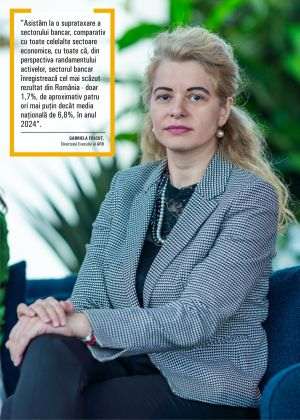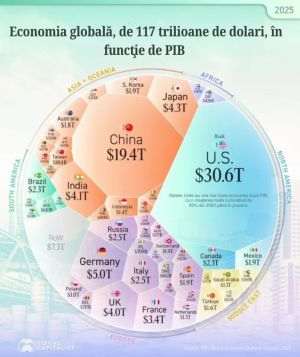The issue of the merger between the Bucharest Stock Exchange and Sibex is once again being brought up, after countless failed attempts.
The shareholders of Sibex have been summoned, on September 23rd, to decide empowering the Board of Directors to initiate and hold talks with the management of the Bucharest Stock Exchange in order to establish potential collaboration relations, including on the aspects which concern a merger, and the results of those talks would be presented in a General Shareholder Meeting.
Ovidiu Petru, the CEO of the Sibiu Stock Exchange, thinks that Sibex and the BVB should be two markets with complementary mechanisms and products. He said: "Through a joint effort, the two operators could support an increase in the competitiveness of the Romanian stock market on a regional, and why not, on a European level.
Such a partnership between Sibex and a BSE should not be considered a "surrender", on either side - as some might be quick to view it, instead it should be viewed from the angle of the benefits which a constant and open communication of ideas, projects and know how would bring to both parties involved and to the local capital market.
More to the point, there are multiple projects which the two operators could cooperate on - with the help and the guidance of the authority, of course: -stock lending and short-selling, derivatives with delivery, index-based derivatives, promoting the local products on a regional level, exploiting in that regard including the regional partnerships which Sibex currently has implemented.
At the last minute, Sibex, the BSE and the entities in the groups of the two operators, as well as the authority and the participants of the local market should join their forces in an efficient manner to be able to facilitate the concretization of the goal of becoming an emerging market by: improving the efficiency of the stock lending and short-selling mechanisms, the development of the local derivatives, after trading products and mechanisms which would boost an increase in liquidity for the spot and the derivatives market alike".
In the context of the project to unite the European capital markets, it is becoming increasingly clear that the domestic capital market, whether we are talking about the spot or the derivative market, can only set itself apart through the individuality of the products it is offering, the CEO of Sibex says: "It is also obvious that a regulated derivative exchange such as Sibex can not «compete» with some forex platforms, by allowing trading of predominantly foreign derivative products, especially when there are clear signs that, both for local customers and for foreign ones of the project of the shared platform which Sibex has been «displaying» its products since December 2014, the domestic derivatives are preferable to some exotic foreign products".
The CEO of SIF2 Moldova, Costel Ceocea, recently raised the issue of the merger of the two exchanges, in an interview he granted "BURSA", published on June 8th. He thinks that in the current market context, and of the evolution of the BSE and Sibex, talks and analyses on their merger can be resumed, given that they have common shareholders: "The comparative analysis of the price and liquidity of the two shares, can lead to the conclusion/anticipation of some benefits if the merger were approved. A potential initial operation of selling the shares of Sibex and of shareholder concentration could subsequently facilitate the passing of the decision concerning the merger of the two market operators" .
A first failed attempt at a merger took place in 2006, when the General Shareholder Meeting of the Bucharest Stock Exchange rejected the merger project. The main reason was the parity proposed between the shares of the two exchanges.
The shareholders of the two operators have had the issue on the agenda of the General Shareholder Meetings afterwards, but the merger did not materialize.
The BSE and Sibex had talks on collaboration, in 2013, for the implementation of a local central counterparty (CCP), but the negotiations failed. As a result, the BSE dropped the derivatives market, and Sibex has turned to the CCP of the Greeks' Athex.
In the beginning of his term as CEO of the BSE, Ludwik Sobolewski was saying that he had no opinions on a possible merger with Sibex. He was saying: "We have this situation which, from a structural point of view, is not optimal, namely, there are two exchanges in Romania, but I don't think that Sibex is a competitive threat to the BSE. Then, I don't see a future for Sibex, as a business idea. I can tell you that when I decided, as CEO of the Warsaw Stock Exchange, to buy a stake in Sibex, I had two reasons. First of all, I wanted to be closer to the Romanian market, thinking that it could have potential. Second of all, what also mattered was the outlook of a merger between Sibex and the BSE".
• Ovidiu Petru: "The project of energy derivatives has entered the final stage"
The shareholders of Sibex also have on the agenda the delegation to the Board of Directors of the ability to approve the regulations needed for the organization and operation of the regulated market for energy indices derivatives.
According to Ovidiu Petru, the project of energy derivatives has entered the final stage.
He told us: "We have, as you know, a trading solution, which has been agreed upon in principle, since back in March. As for the clearing solution for the derivatives market, and given the inexistence of a local CCP as well as the degree of specialization required for the clearing of energy derivatives, we have been forced to seek solutions abroad, both regionally, and on a European level, with the final decision to be made following a careful analysis. Also, we are working closely with the ASF to find the optimal methods to integrate a market, whose design is completely new in the landscape of the domestic capital market, in the context of the current legislation and especially in the context of the new European regulations (MiFID2). Thus, together with the Authority we are currently reviewing first and foremost: the concrete method of integrated oversight at the level of the relevant authorities of the new market in correlation with the spot energy market and to what extent the spot market participants' access to this market can be made easier through a distinct regulation.
The result of this study will underlie the regulations concerning the organization and functioning of the new market and implicitly of the whole project".
Sibex recently announced that Deutsche Börse would provide it with the electronic and infrastructure systems for the trading of energy derivatives, following a Collaboration Protocol. Also, Deutsche Börse would facilitate the access to the clearing-settlement system for the energy derivatives.
According to its officials, Sibex intends to set up and manage a regulated market for derivatives that have electricity as their underlying asset, using a Deutsche Börse system aimed at commodity exchanges.
Sibex has announced the launch of the energy derivatives since back in July 2013, after concluding an agreement with the energy market operator OPCOM, wholly owned by Transelectrica. The Bucharest Stock Exchange also had a partnership for energy derivatives with the OPCOM, since back in 2010, but failed it to materialize it.
In the General Shareholder meeting of September 23rd, the shareholders of Sibex will elect another member on the Board of Directors, will approve new fees and whether to file a liability lawsuit against former administrator Cristian Sima or not.




























































